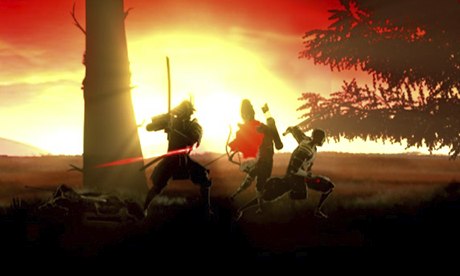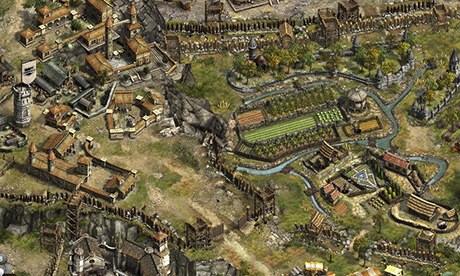
Sometimes you have to see a place through fresh eyes to appreciate it. This writer, having grown up in Dublin, takes for granted a lot of the best things about the city: its size, its nightlife, its people, instead focusing on its bad weather and worse economy. Beyond these shores, media horror stories paint an even bleaker picture of Ireland, with property crashes, bad banks and game office closures including Big Fish and PopCap.
But there's a veritable infestation of start-ups in Dublin at the moment. And thankfully, entrepreneurs, investors and high-level employees from outside the country are coming here for reasons beyond tax breaks and location.
"Derelict warehouse, plus IKEA, equals the Digit offices," says Richard Barnwell, founder and CEO of Digit Games, a new company that employs dozens of people for Kings of the Realm, an ambitious cross-platform online MMO. So far, Digit has received total investment of $3.75m (£2.3m) to date. Their office sits in Dublin City between the prestigious Trinity College and the banks of the river Liffey, and is a stone's throw away from Google's European HQ.
To say that the past few years have been turbulent for Ireland is an understatement, but some government bodies like Enterprise Ireland are doing real, tangible work in helping start-ups; providing finance (in the form of investment), guidance and even help with contacts across different industries. Enterprise Ireland (or "EI") comes up in just about every conversation I have with developers.
"The reason we came here was the interest from the likes of Enterprise Ireland," says Barnwell. "When we started talking to people, saying it was a serious start-up, going out the gate with a million [pounds] worth of funding; we had offers from five countries. We had a lot of interest about doing game things here that we didn't get from other countries, nowhere near the level. As soon as we started talking to people like EI, they were incredibly keen to support us. Not really financially, we didn't need investment from them, but actually just opening doors – giving access to their west coast US offices and their German offices, literally they were saying 'let us help you meet people in developing territories' which has been incredibly useful; the kind of support which nobody else was offering. You can't really put a price on that because they've made introductions which could be worth an absolute fortune for us."
Political power-ups
Irish politicians have generally been supportive. I have fond memories of seeing Taoiseach Enda Kenny at the launch of Bioware's call centre in Galway, making a speech about steep learning curves and then being shown how to play the Star Wars MMO. Yes, there have been some embarrassingly old-fashioned comments, including President Michael D Higgins dismissing the pursuit outright and TD [Teachta Dála – member of parliament] Mary Mitchell O'Connor's misbegotten press release condemning Call of Duty and advising parents to buy their kids books instead of games. But more often, the politicians see the games for what they are: a thrilling, creative, and sometimes lucrative young industry and possibly a way to connect with younger constituents.
Paschal Donohoe, a former senator who's recently been promoted to minister of state for European affairs, has been a long-term advocate for the Irish games industry. "There's more of an understanding of [gaming among Irish politicians] than you might expect," he says. "An example I'd give, it might be apocryphal, but it does illustrate a point, is around 18 months ago I set up a session in Leinster House to brief people on the digital games industry and what more we could do. And normally, when you organise these kinds of briefings, you get a handful of Oireachtas [parliament] members and a lot of staff. The room was packed. Packed. We had a huge number of TDs and senators, government ministers, and I've never seen a briefing ever as full as that.
"I think that was a real illustration of the fact that there's a growing recognition amongst the political groups and classes. The simple reason is the advent of casual gaming. If you have a group of people for whom the use of a mobile phone is an integral part of their day-to-day life or how they communicate with the outside world, how can you avoid the advent and development of casual gaming on those devices? And that's so apparent. Because of that there's been a percolation into politicians, including here in Ireland."
Donohoe believes that interactive storytelling is a natural progression of Irish traditions: "There is a part of our Irish culture, spirit and soul that is creative. There is an interest in the development of storytelling, whether it's through music, short stories or books. And I think some of our young men and women who might have looked to be the next David Lynch or Neil Gaiman now think of digital gaming as a way to express themselves and create worlds and tell stories."
The carrot for outside investment seems to be financial, and there is an entrepreneurial spirit here. But in an industry as young as gaming, competition is also fierce for high-end employees. Barnwell, a Cambridge native, claims that the size and vibe of Dublin is an attraction. "Those that worked in London, or any major city, will appreciate the beauty of Dublin being so small," he says. "You just walk everywhere. If someone's got a meeting, I leave half an hour before it and walk there. It's a nicer way to live a life. You can enjoy the city. In London you don't get that.
"We had offices all over [London] city. I'd leave the house at 5.30 in the morning just to be in the office for seven, because you had to get the train, the tube. You'd spent the entire time in tubes getting in and out of them to get from place to place. And you still wouldn't get home until eight or nine at night. And it's not like you get anything done, because you don't. You just spend the whole time squeezing in and out of trains."
 Kings of the Realm
Kings of the Realm Extra lives
However, for many Dubliners, jaunty commutes don't quite compensate for fickle employers: The departure of PopCap's European HQ (and with it, nearly 100 jobs) and then Jolt leaving, and taking 50 jobs with them, were major blows for the city. The problem with jobs from foreign investment is that they can – and do – up sticks and leave at a moment's notice.
The departure of these games companies is reminiscent of the Don Bluth situation: Sullivan Bluth Studios was a Dublin-based animation company best-known for An American Tale (a Disney collaboration) and The Land Before Time. After a few high-profile flops, they closed up shop here in 1995, but left a legacy of a world-class third-level animation course (still running in Ballyfermot, west Dublin) and some of its former employees went on to form multi-Oscar-nominated Brown Bag Films, Jam Media (who make BBC's Roy) and the Emmy-nominated Boulder Media.
Seadna Long, one of the founders of SixMinute Games, is a former employee of PopCap. He claims that the industry in Dublin is much better than it was this time last year because of the volume of indies and the experience they've acquired. "It's a fair comparison," he says when I mention Sullivan Bluth. "We know some of the guys who went through that [in animation]. The quality that came from the [big] studios is amazing. We know guys in Boulder who went through that. We still have a lot to prove to say that we could be successful as one of those companies. If we're anywhere near Brown Bag, we'll all be quite happy."
SixMinute is one of many young Irish developers that works in an "incubation" centre – cheap and sometimes free space given by patrons of the industry, be they government or corporate. Two of Dublin's most exciting developers work within a few feet of one another in a room in the corner of Digit's building: bitSmith and BatCat. The former made Kú, a Zelda-style mobile game that was critically acclaimed (by the Guardian and Edge among others) and BatCat, which made the nifty twin-stick shooter P-3 Biotic and is working on a promising hack-and-slash called Honour Bound.
"On one hand, I feel tremendously supported by the government and everything they've done for us," says Owen Harris, studio head for bitSmith. "This company wouldn't exist without the help of EI and Foras na Gaeilge [an organisation that promotes the Irish language] and all the other bodies that have helped us along the way. That's been huge. On the other hand, sometimes you can't help but look at either games education or the film industry and get slightly jealous of what they have."
But compared to even 12 months ago, Harris is optimistic about the scene: "I think it's maturing. There are opportunities and dangers. I think it's wonderful that many of us are working on our second game. It takes time to learn this craft and to get better at it. And you can see certainly, what I see across the room, it's tremendous the way Honour Bound is coming together. And in our second game, FranknJohn you can see a real jump in quality, in game design and production."
"We're only learning this through mistakes and failures and eventually you stumble upon something that works and you try to incorporate that into your routine. It's an ongoing process. Where we are now from a year ago, we have more experience in the country. More experience through making mistakes and making games. So that's the exciting thing. They way we combat the problem of inexperience is by having a very open relationship between different companies and trying to help each other out wherever we can."
Andrea Magnorsky, CTO for BatCat, agrees with Owen: "From last year, I totally agree on the point about evolution. You see some people still there, some sadly gone, but now there are loads of new [indie developers]. Or some people changing things as well, but I guess that's expected and good. I'm glad we're still here. It's like a surprise: Surprise! We're still here another year!"
"But yeah, we've learned a lot by mistakes. It's evolving and it's also dangerous, because we're in a crucial point where there's a level of support and knowledge that needs to come into place for this to go bigger. Otherwise we could all survive … ish."
Magnorsky concedes there are sceptics in Irish business and government, but one or two high-profile successes will be enough to win people over: "I think there are a few key companies who need success for people's perceptions to be positive; for them to say 'oh yeah' and stroke their chins."


Sign up for the Guardian Today
Our editors' picks for the day's top news and commentary delivered to your inbox each morning.
Sign up for the daily email
Source: Tablet Android
0 komentar "Ireland's game scene back on its feet", Baca atau Masukkan Komentar
Posting Komentar